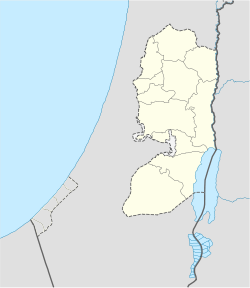Top Qs
Timeline
Chat
Perspective
Jinba
Village in Hebron Governorate, Palestine From Wikipedia, the free encyclopedia
Remove ads
Jinba (Arabic: جنبا) is a Palestinian village located in the south-western corner of Masafer Yatta in the Hebron Governorate, in the southern West Bank. It is administered under Palestinian local frameworks but lies within Area C of the West Bank, under full Israeli civil and military control. The hamlet faces chronic challenges related to displacement, loss of infrastructure, and settler-related violence.[1]
Remove ads
History and archaeology
Summarize
Perspective


The Masafer region is called after the Arabic words for 'traveling.'[2] The 2024 documentary film No Other Land, winner of the Best Documentary Oscar, focuses on Jinba in Masafer Yatta.
Jinba is first mentioned as an important stop on the Gaza-Hebron-al-Karak road in the early 14th century.[3]
In 1838, Edward Robinson and noted Jinba as a ruin located south of Jabal al-Khalil (the Hebron Hills).[4] It appears Jembeh on Van de Velde's map of Palestine, charted in 1851-1852, and published in 1858. In the 1870s, the Survey of Western Palestine recorded Khurbet Janbah as showing “traces of ruins,” with “foundations and heaps of stones.”[5]
Jinba was resettled by families from Yatta in the 19th century. The area encompasses caves and terraced fields that local scholars and residents identify as part of longstanding seasonal and permanent habitation.Geographer Natan Shalem noted that Jinba included cave dwellings and flint tools from ancient periods. These suggest a continuity of human presence, though no formal excavations have been reported.[6]
In the British Mandate Period, Jinba's residents relied on a mixed agrarian economy of animal husbandry, orchard cultivation and field crops. Traditionally, Jinba’s residents lived in caves and practiced rainfed agriculture and pastoralism. These practices are regarded as part of the area’s intangible cultural heritage, linking Jinba to neighboring communities such as al-Mufaqara and al-Qaryatain.[7]

On 26 May 1951, a group of Israeli paratroopers under the command of Lieutenant-Colonel Ariel Sharon attacked Jinba. The raid, reportedly carried out in retaliation for the theft of sheep from Kibbutz Ein Gedi, resulted in the killing of two Jordanian National Guardsmen and two Palestinian farmers. The raiders also killed two camels before withdrawing without recovering any sheep.[8]
Jinba was one of the targets of the large Israeli military assault of 13 November 1966. According to United Nations observers, 15 stone houses in the village were blown up, seven more were damaged, a water cistern was destroyed, and livestock including a camel was killed. The Israeli forces, consisting of tanks and armored vehicles, crossed the ceasefire line at dawn and shelled the area before entering the village and detonating explosives inside the houses. Families later received compensation through the Jordanian authorities, who distributed payments from Israel via the Red Cross: 350 Jordanian dinars for each stone house, 100 dinars per camel, and seven dinars per sheep. Oral testimonies from residents such as Halima Abu Aram describe the bombardment, flight to nearby hills, and the destruction of houses and shops that formed a settled village. Stone houses were built around caves from the 1940s, and by 1967 the Israeli occupation itself documented caves as permanent dwellings in its surveys, before later denying the existence of the village.[9]
Remove ads
Legal-administrative context

Since 1967, Masafer Yatta—including Jinba—has fallen within Israel’s declared Firing Zone 918, allowing routine demolitions and displacement under the Israeli military framework.[10] A 2022 Israeli Supreme Court ruling upheld eviction orders affecting eight penalized hamlets in Masafer Yatta, potentially impacting over 1,000 residents.[citation needed]
Jinba’s residents frequently face demolition orders for homes, cisterns, and solar units due to the difficulty of obtaining Israeli-issued building permits. Many inhabitants rely on temporary structures and community cisterns.[11]
Remove ads
Depopulation and settler attacks
Summarize
Perspective

Between the 1980s and present, Jinba has experienced repeated displacement pressures — including home demolitions, water-point destruction, and restrictions on grazing lands.[citation needed]
In early 2025, residents documented multiple settler and military raids:
- Dozens of settlers, sometimes accompanied by Israeli forces, raided Jinba, injuring villagers—including children—and ransacking homes and solar installations.[12]
- Structures were vandalized during night raids; cameras and school-related infrastructure were destroyed.[13]
- Israeli forces arrested over 20 Palestinians, while no settlers were detained; several Palestinians were hospitalized with skull fractures and chest injuries.
On March 28, 2025 a mob composed of settler militiamen and IDF troops assaulted Jinba, pillaging its houses, and attacking its inhabitants. One survivor narrated,
“They carried hammers and smashed everything: houses, furniture, kitchens, refrigerators, and washing machines. They left nothing intact. They forced us to sit outside in terrible weather, from 1 a.m. until 6:30 a.m. When we returned, we saw they had slashed the women’s clothes with knives.” — Musa Jabrin Rabi’, resident of Jinba.[14]
The incident drew international condemnation, and forced the IDF spokesperson to issue a statement acknowledging that "troops vandalized and damaged equipment on-site [...] Additionally, the troops failed to report the irregular activity, which was only discovered through footage circulated on social media." The internal IDF audit focused on administrative, command and control questions, and not on the damage inflicted on the Palestinian civilians. No compensation was offered, and the army threatened "to continue operating resolutely to maintain security in the area," hinting at future raids against civilian targets in the area.[15]
The increasing persecution, harassment and violence have compelled many families to leave Jinba—a process NGOs described as ethnic cleansing.[16][17][18]
Remove ads
Population and livelihoods


Local inhabitants are sedentary farmers, numbering approximately 150–300 in recent years.[citation needed] They speak Arabic and maintain livelihoods based on goat herding, olive cultivation, and grazing. Dependence on water tankers, solar panels, and community cisterns is common due to limited infrastructure access.
Remove ads
References
See also
Wikiwand - on
Seamless Wikipedia browsing. On steroids.
Remove ads


